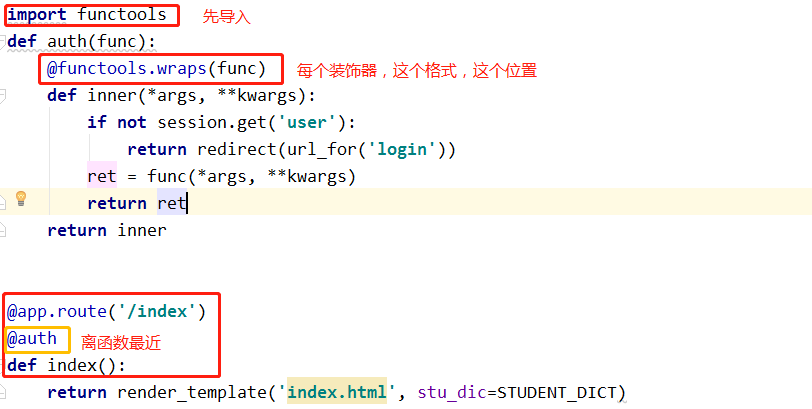Flask框架 之 学生管理分析
先看模板吧。
index.html
<body>
<h1>学生列表</h1>
<table border="1">
<thead>
<tr>
<th>ID</th>
<th>姓名</th>
<th>年龄</th>
<th>性别</th>
<th>选项</th>
</tr>
</thead>
<tbody>
{% for k,v in stu_dic.items() %}
<tr>
<td>{{k}}</td>
<td>{{v.name }}</td>
<td>{{v.age}}</td>
<td>{{v.gender}}</td>
<td>
<a href="/detail/{{k}}">查看详细</a>
|
<a href="/delete/{{k}}">删除</a>
</td>
</tr>
{% endfor %}
</tbody>
</table>
detail.html
<body>
<h1>学生详细</h1>
<ul>
{% for item in info.values() %}
<li>{{item}}</li>
{% endfor %}
</ul>
</body>
app.py
from flask import Flask,render_template,request,redirect,session,url_for,jsonify,make_response,Markup,flash,get_flashed_messages
app = Flask(__name__)
STUDENT_DICT = {
1:{'name':'王龙泰','age':38,'gender':'中'},
2:{'name':'小东北','age':73,'gender':'男'},
3:{'name':'田硕','age':84,'gender':'男'},
}
我们如何对这些数据进行操作呢?
@app.route('/index')
def index():
print('index')
return render_template('index.html',stu_dic=STUDENT_DICT)
@app.route('/delete/<int:nid>') #指定为Int,否则为str
def delete(nid):
del STUDENT_DICT[nid]
return redirect(url_for('index'))
@app.route('/detail/<int:nid>')
def detail(nid):
info = STUDENT_DICT[nid]
return render_template('detail.html',info=info)
后台管理是随便可以看的吗?是不是应该先登录后进行操作呢?
@app.route('/login',methods=["GET","POST"])
def login():
print('login')
if request.method == 'GET':
return render_template('login.html')
user = request.form.get('user')
pwd = request.form.get('pwd')
if user == 'oldboy' and pwd == '666':
session['user'] = user #存入session
return redirect('/index')
return render_template('login.html',error='用户名或密码错误')
不要忘了存入session需要加盐。app.secret_key="xxxxx"
然后呢?
从session中取到随机字符串,判断是否登录。每个操作都要校验,每个函数都要加(以index为例)。
版本一:
@app.route('/index')
def index():
if not session.get('user'):
return redirect(url_for('login'))
return render_template('index.html',stu_dic=STUDENT_DICT)
每个函数都要加,是不是太麻烦了。我们可以写个装饰器。
版本二:
#装饰器
def auth(func):
def inner(*args,**kwargs):
if not session.get('user'):
return redirect(url_for('login'))
ret = func(*args,**kwargs)
return ret
return inner
@app.route('/index')
@auth
def index():
return render_template('index.html',stu_dic=STUDENT_DICT)
结果你发现会报错。

这是因为每个函数执行装饰器,函数名都会变为inner,重名出错不是很正常吗?关键是我们如何解决?
这里就用到了functools模块。

这个模块加入装饰器,我们执行函数时,虽然看似是inner,但本质是各函数名。
这样就解决了这个问题。可是如果用到装饰器的地方少,可以这样写,如果多呢?我们总不能还是每个函数都加。
装饰器应用场景:比较少的函数中需要额外添加功能。
注意:以后写装饰器时,都要记得使用functools模块。
版本三:
我们需要写一个函数,这个函数执行代表所有的操作,下面的操作就可以简单明了。
before_request装饰的这个函数,在我们的视图函数执行之前,无论哪个请求,都会先执行一下。就跟django中间件中的process_request有点像。每个请求进来都要经过它。
所以在要操作的函数之前再写一个函数。
@app.before_request
def xxxxxx():
if request.path == '/login':
return None #可以通过
if session.get('user'):
return None #已登录,可以通过
return redirect('/login') #否则,回到登录页面
这种方法使用于批量添加操作时。

